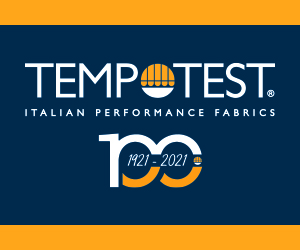Satin's Wood Sets Sail to Italy With ''Casamatta'' in Tow
April 26, 2002
Thai Producer Tentatively Planning a Public Offering in 2004
Bangkok, Thailand - Satin Textiles Co. Ltd., primarily a drapery fabric house, is steering a course past China on a direct route to Italy with its new ''Casamatta'' collection of fabrics in the $5-$12 price range.
Casamatta, which means ''crazy house'' in Italian, is designed to sell through Italian wholesalers who are looking for better product for the domestic Italian market, according to Schle Wood, president and principal of Satin.
''If we can sell to Italy, then we can sell to anyone,'' Wood said. ''It will be challenging but Italy wants to import fabrics today.''
Satin will unveil Casamatta during Proposte at the Grand Hotel. Satin is also exhibiting less expensive lines at Scoperta. Satin generated $22 million in sales last year. Wood said that if his plans for Italian-inspired collections materialize, he expects the business to grow to $40 million by 2007.
As part of the effort, the company is looking for Italy-based agents to represent the new line. Currently, Satin is represented in America through Joyce Siegle; in the U.K. through B&S Textiles; in Australia through Alexander McKay; and in Nagoya, Japan Mike Miyi.
In the meantime, the company is bulking up at home. Already the largest powerloom producer in Thailand, Satin is completing the construction of a 500-acre campus, 80 kilometers outside of Bangkok. The project, which costs $10 million for new structures alone, includes a new mill designed by Italian architect Oliviero Godi. The installation of 72 Somet looms with Bonas heads is nearing completion. Satin has also built a weaving shed and a dye house capable of handling his projected output for the next five years.
Wood said that Satin's facilities are more like an art gallery than a mill building. ''I wanted to build a showcase for the Thai textile industry,'' Wood said. The plans were developed from Wood''s original AutoCAD drawings.
The square-shaped dye house features walls with a space between the roof and the top of the wall that will not let Monsoon rains in. An outside wall allows natural ventilation. The water used in the dye house is recycled and potable enough for healthy fish in the man-made lake in front of the mill. The effluent is used for irrigation purposes. Throughout the campus canals combine the natural surroundings with the buildings. A bunker for special meetings, and the upper part of the mill and showroom are built into the earth for a low-rise effect.
The physical plant includes on-site housing for 500 workers and their families that will be more like a resort than a housing project. Wood hopes the campus inspires his 800-man work force and gives them an environment with a great lifestyle. ''I want the workforce here to feel valuable,'' he said.
The company is tentatively planning a public offering of stock on the Thai exchange (SET) by 2004. Wood owns 50 percent of the company and the balance is owned by five industrial and fashion textile companies who are advisers to Wood.
Satin is also in the process of developing an apparel fabrics business whose designs will be based on some of its drapery fabric constructions. Wood said the company will court a famous fashion house with the new apparel line.
Wood also has an interest in Nitas, which sells fabrics to the local Thai market and exports to Singapore, Malaysia and Hong Kong. Wood's brother, Panar, owns and runs the company. Satin also has a finished products division for the local market under the ''Genua'' home fashions brand. This division is scheduled to be expanded beyond the local market for export as part of the overall business expansion.
Satin Textiles was started by Wood''s father as a towel and ticking mill 25 years ago in Prapadang, about an hour west of Bangkok. Administration and marketing are located in downtown Bangkok in the Klongsarn section.
The original mill will continue to produce the jacquard drapery fabric initiated by Wood after he graduated from the Philadelphia College of Textiles. These lines sell through English wholesalers Romo, High Style, Montgomery and Hardy. Satin also sells in Japan to Sangetsu and C. Kondo. Wood said export is 20 percent of the business and growing. ''We want to consolidate our base of business and improve quality, service and delivery,'' Wood said. In the process, he hopes to reduce lead-times from 60-90 days to 45-60 days. F&FI
Bangkok, Thailand - Satin Textiles Co. Ltd., primarily a drapery fabric house, is steering a course past China on a direct route to Italy with its new ''Casamatta'' collection of fabrics in the $5-$12 price range.
Casamatta, which means ''crazy house'' in Italian, is designed to sell through Italian wholesalers who are looking for better product for the domestic Italian market, according to Schle Wood, president and principal of Satin.
''If we can sell to Italy, then we can sell to anyone,'' Wood said. ''It will be challenging but Italy wants to import fabrics today.''
Satin will unveil Casamatta during Proposte at the Grand Hotel. Satin is also exhibiting less expensive lines at Scoperta. Satin generated $22 million in sales last year. Wood said that if his plans for Italian-inspired collections materialize, he expects the business to grow to $40 million by 2007.
As part of the effort, the company is looking for Italy-based agents to represent the new line. Currently, Satin is represented in America through Joyce Siegle; in the U.K. through B&S Textiles; in Australia through Alexander McKay; and in Nagoya, Japan Mike Miyi.
In the meantime, the company is bulking up at home. Already the largest powerloom producer in Thailand, Satin is completing the construction of a 500-acre campus, 80 kilometers outside of Bangkok. The project, which costs $10 million for new structures alone, includes a new mill designed by Italian architect Oliviero Godi. The installation of 72 Somet looms with Bonas heads is nearing completion. Satin has also built a weaving shed and a dye house capable of handling his projected output for the next five years.
Wood said that Satin's facilities are more like an art gallery than a mill building. ''I wanted to build a showcase for the Thai textile industry,'' Wood said. The plans were developed from Wood''s original AutoCAD drawings.
The square-shaped dye house features walls with a space between the roof and the top of the wall that will not let Monsoon rains in. An outside wall allows natural ventilation. The water used in the dye house is recycled and potable enough for healthy fish in the man-made lake in front of the mill. The effluent is used for irrigation purposes. Throughout the campus canals combine the natural surroundings with the buildings. A bunker for special meetings, and the upper part of the mill and showroom are built into the earth for a low-rise effect.
The physical plant includes on-site housing for 500 workers and their families that will be more like a resort than a housing project. Wood hopes the campus inspires his 800-man work force and gives them an environment with a great lifestyle. ''I want the workforce here to feel valuable,'' he said.
The company is tentatively planning a public offering of stock on the Thai exchange (SET) by 2004. Wood owns 50 percent of the company and the balance is owned by five industrial and fashion textile companies who are advisers to Wood.
Satin is also in the process of developing an apparel fabrics business whose designs will be based on some of its drapery fabric constructions. Wood said the company will court a famous fashion house with the new apparel line.
Wood also has an interest in Nitas, which sells fabrics to the local Thai market and exports to Singapore, Malaysia and Hong Kong. Wood's brother, Panar, owns and runs the company. Satin also has a finished products division for the local market under the ''Genua'' home fashions brand. This division is scheduled to be expanded beyond the local market for export as part of the overall business expansion.
Satin Textiles was started by Wood''s father as a towel and ticking mill 25 years ago in Prapadang, about an hour west of Bangkok. Administration and marketing are located in downtown Bangkok in the Klongsarn section.
The original mill will continue to produce the jacquard drapery fabric initiated by Wood after he graduated from the Philadelphia College of Textiles. These lines sell through English wholesalers Romo, High Style, Montgomery and Hardy. Satin also sells in Japan to Sangetsu and C. Kondo. Wood said export is 20 percent of the business and growing. ''We want to consolidate our base of business and improve quality, service and delivery,'' Wood said. In the process, he hopes to reduce lead-times from 60-90 days to 45-60 days. F&FI
















